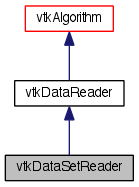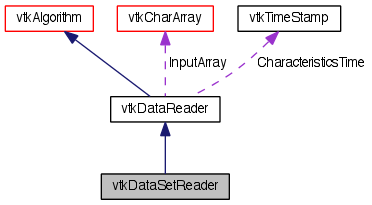class to read any type of vtk dataset More...
#include <vtkDataSetReader.h>


Detailed Description
class to read any type of vtk dataset
vtkDataSetReader is a class that provides instance variables and methods to read any type of dataset in Visualization Toolkit (vtk) format. The output type of this class will vary depending upon the type of data file. Convenience methods are provided to keep the data as a particular type. (See text for format description details). The superclass of this class, vtkDataReader, provides many methods for controlling the reading of the data file, see vtkDataReader for more information.
- Warning:
- Binary files written on one system may not be readable on other systems.
- See also:
- vtkDataReader vtkPolyDataReader vtkRectilinearGridReader vtkStructuredPointsReader vtkStructuredGridReader vtkUnstructuredGridReader
- Examples:
- vtkDataSetReader (Examples)
- Tests:
- vtkDataSetReader (Tests)
Definition at line 52 of file vtkDataSetReader.h.
Member Typedef Documentation
Reimplemented from vtkDataReader.
Definition at line 56 of file vtkDataSetReader.h.
Constructor & Destructor Documentation
| vtkDataSetReader::vtkDataSetReader | ( | ) | [protected] |
| vtkDataSetReader::~vtkDataSetReader | ( | ) | [protected] |
Member Function Documentation
| static vtkDataSetReader* vtkDataSetReader::New | ( | ) | [static] |
Create an object with Debug turned off, modified time initialized to zero, and reference counting on.
Reimplemented from vtkDataReader.
| static int vtkDataSetReader::IsTypeOf | ( | const char * | name | ) | [static] |
Return 1 if this class type is the same type of (or a subclass of) the named class. Returns 0 otherwise. This method works in combination with vtkTypeMacro found in vtkSetGet.h.
Reimplemented from vtkDataReader.
| virtual int vtkDataSetReader::IsA | ( | const char * | name | ) | [virtual] |
Return 1 if this class is the same type of (or a subclass of) the named class. Returns 0 otherwise. This method works in combination with vtkTypeMacro found in vtkSetGet.h.
Reimplemented from vtkDataReader.
| static vtkDataSetReader* vtkDataSetReader::SafeDownCast | ( | vtkObjectBase * | o | ) | [static] |
Reimplemented from vtkDataReader.
| virtual vtkObjectBase* vtkDataSetReader::NewInstanceInternal | ( | ) | const [protected, virtual] |
Reimplemented from vtkDataReader.
| vtkDataSetReader* vtkDataSetReader::NewInstance | ( | ) | const |
Reimplemented from vtkDataReader.
| void vtkDataSetReader::PrintSelf | ( | ostream & | os, |
| vtkIndent | indent | ||
| ) | [virtual] |
Methods invoked by print to print information about the object including superclasses. Typically not called by the user (use Print() instead) but used in the hierarchical print process to combine the output of several classes.
Reimplemented from vtkDataReader.
Get the output of this filter
| vtkDataSet* vtkDataSetReader::GetOutput | ( | int | idx | ) |
Get the output of this filter
Get the output as various concrete types. This method is typically used when you know exactly what type of data is being read. Otherwise, use the general GetOutput() method. If the wrong type is used NULL is returned. (You must also set the filename of the object prior to getting the output.)
Get the output as various concrete types. This method is typically used when you know exactly what type of data is being read. Otherwise, use the general GetOutput() method. If the wrong type is used NULL is returned. (You must also set the filename of the object prior to getting the output.)
Get the output as various concrete types. This method is typically used when you know exactly what type of data is being read. Otherwise, use the general GetOutput() method. If the wrong type is used NULL is returned. (You must also set the filename of the object prior to getting the output.)
Get the output as various concrete types. This method is typically used when you know exactly what type of data is being read. Otherwise, use the general GetOutput() method. If the wrong type is used NULL is returned. (You must also set the filename of the object prior to getting the output.)
Get the output as various concrete types. This method is typically used when you know exactly what type of data is being read. Otherwise, use the general GetOutput() method. If the wrong type is used NULL is returned. (You must also set the filename of the object prior to getting the output.)
| virtual int vtkDataSetReader::ReadOutputType | ( | ) | [virtual] |
This method can be used to find out the type of output expected without needing to read the whole file.
| virtual int vtkDataSetReader::ProcessRequest | ( | vtkInformation * | request, |
| vtkInformationVector ** | inInfo, | ||
| vtkInformationVector * | outInfo | ||
| ) | [protected, virtual] |
Upstream/Downstream requests form the generalized interface through which executives invoke a algorithm's functionality. Upstream requests correspond to information flow from the algorithm's outputs to its inputs. Downstream requests correspond to information flow from the algorithm's inputs to its outputs. A downstream request is defined by the contents of the request information object. The input to the request is stored in the input information vector passed to ProcessRequest. The results of an downstream request are stored in the output information vector passed to ProcessRequest. An upstream request is defined by the contents of the request information object. The input to the request is stored in the output information vector passed to ProcessRequest. The results of an upstream request are stored in the input information vector passed to ProcessRequest. It returns the boolean status of the pipeline (false means failure).
Reimplemented from vtkDataReader.
| virtual int vtkDataSetReader::RequestData | ( | vtkInformation * | , |
| vtkInformationVector ** | , | ||
| vtkInformationVector * | |||
| ) | [protected, virtual] |
Reimplemented from vtkDataReader.
| virtual int vtkDataSetReader::RequestDataObject | ( | vtkInformation * | , |
| vtkInformationVector ** | , | ||
| vtkInformationVector * | |||
| ) | [protected, virtual] |
| virtual int vtkDataSetReader::FillOutputPortInformation | ( | int | port, |
| vtkInformation * | info | ||
| ) | [protected, virtual] |
Fill the output port information objects for this algorithm. This is invoked by the first call to GetOutputPortInformation for each port so subclasses can specify what they can handle.
Reimplemented from vtkAlgorithm.
| virtual int vtkDataSetReader::RequestInformation | ( | vtkInformation * | , |
| vtkInformationVector ** | , | ||
| vtkInformationVector * | |||
| ) | [protected, virtual] |
Reimplemented from vtkDataReader.
The documentation for this class was generated from the following file:
- dox/IO/Legacy/vtkDataSetReader.h
 1.8.0
1.8.0